
I read and reviewed Jim Harrison’s final collection of poetry, Dead Man’s Float, for the Missoula Independent in January of 2016. One of the first poems to strike me deeply is called “Notes on the Sacred Art of Log Sitting.” The poem, which is more prose than verse, begins with the poet talking about his recovery from back surgery, and how the chief neurologist tells him, “You can walk your way out of this.” The second stanza, a testimonial to Harrison’s desire to do so, is also a kind of prayer to his dog, a yellow lab named Zilpha. The simple line, “I want to walk in the morning with Zilpha again,” repeats five times, and ends with “Amen.”
Harrison describes his attempts to resume bird hunting with his dog, only to find he can no longer keep up. “My shuffling mood was always corrected by sitting on an oak log,” he writes, “so I decided to make some notes on the sacred art of log sitting.” He goes on to list several “rules” for his new art, which is essentially a call to sit, and be still. To slow down. Observe.
And, after performing the ritual, he reveals:
“When you get in your car it will seem as wretched as it is. A horse would be far better. For hours your mind will still be absorbed in the glory of what you saw rather than mail, emails, cell phones, TV, etc. Hopefully log sitting will allow you to change the contents of your life. You will introduce yourself as a “log sitter” rather than a novelist, detective, or mortician. You will walk more slowly and perhaps your feet will shuffle like mine. I can readily imagine buying a small ranch I’d call “The Log Ranch.” I’d truck in thirty-three logs and arrange them on the property like the Stations of the Cross. This could soothe me during my limited time in the twenty-first century, which has been very coarse indeed. Especially after Zilpha died.”

“Log Sitting” struck me so much at the time for reasons I didn’t realize until later. When it first crossed my attention I was in the midst of my own long, slow recovery from a tough stretch, thanks in no small measure to a canine sidekick. In my case, a quiet, scruffy, keep-to-herself Jack Russell terrier named Darla. I never took the time to realize her impact, or reflect on it, until she died.
On October 30th, 2014, my father, after a long illness, passed away. It wasn’t unexpected. It sounds horrible to admit, but it was even somewhat welcome because I think the life he’d been living was becoming unlivable. Those suspicions did little to make the pain less sharp. I realized that, should I approach the lifespan of the too-ornery-for-death men of my family, I would likely face more adult years without him in my life than I had enjoyed with him. We had only just begun talking about his life, his past, in ways he’d been close-lipped about before. And then he was gone.
Three days later Velcro, also a Jack Russell — a rescue dog, who was absolutely horrible in all the ways dogs are supposed to be good but we loved her very much anyway — succumbed to an awful, malignant, blood-spurting tumor. She was the second dog we’d lost in about a year; she’d been preceded by Orly, a Jack Russell as well (see a theme here?), who was arguably the toughest, most willful dog I’ve ever known. He was El Rey, the King, who would go by no name but “Juarez” from Cinco de Mayo through Dia de los Muertos. And we damn sure honored those demands. The King left the building after 19 years of being the hero of countless stories. Face-offs with snakes, roadrunners, pitbulls, UPS men and plumbers’ assistants. One of my favorite stories involves a wound he’d received along his ribs during an altercation among our dogs that went unwitnessed by humans. It was gory and deep and required a trip to the emergency clinic for stitches. My wife, Julia, and I were debating whether Velcro or my big dog, Bernard — a mild, somewhat goofy, German shepard/golden retriever cross — had inflicted it. When we got to the vet, Julia asked if he could determine if the slash had been caused “by a big dog’s tooth or a small one’s.” The vet looked at her with a bland expression and said, “This isn’t CSI, ma’am.”
Barely two months later, on December 29th, Bernard followed the two Russells in death, when his legs and lungs could simply no longer sustain his will to be close to us. His passing closed a terrible run of sadness, but, again, not unexpected. When Julia and I got together we combined a menagerie of four dogs and two cats. They were all getting old, and we knew that once one went, the others would soon follow. The two cats lingered … and lingered … and lingered. But Darla, the youngest of the entire bunch, was the last surviving dog.
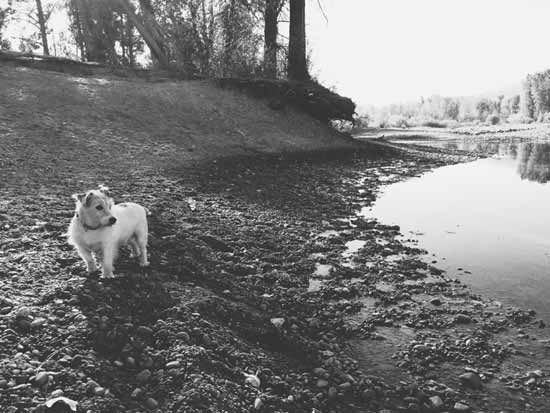
Darla was barely out of puppyhood when she came to Missoula, riding next to Orly on the dashboard of a Dollar rental truck all the way up from Tucson. As a puppy, she and Velcro had wrestled together, but Velcro really didn’t know how to act, and, as Darla aged, that would sometimes result in some knock-down, drag-out, often bloody fights. The violence came to an end one afternoon in our backyard. I was wearing thick leather gloves while doing some maintenance when the two of them viciously went at each other. I pinned them both to the ground, pried their jaws off each other’s necks, and held them until everyone settled. I guess that established me as the boss, I don’t know; they never fought again. For the effort, I earned hands covered in bruises that lingered for a couple weeks.
Darla grew to love Bernard, though. She would often sit directly on him while he slept, and he didn’t seem to mind. When he died, her sadness was apparent. Even one of our cats was sad; Bernard was the gentlest of souls. Darla moped, and sighed, and even developed a limp after an ill-advised leap from the bed. It was terrible to see. I think it was her sadness that got me up off of my ass.
Though I didn’t know it at the time of all this grief, I was closing out my second-to-the-last year of a job I’d held for twelve prior. It required a lot of travel and was wearing me out. I was a manufacturing consultant, and I often found myself dealing in industries that flew in the face of my ethics. My employers were right-wing misogynists. I wasn’t writing. I wasn’t losing myself in the mountains. I was eating too much road food, not doing the things I loved, and was getting fatter and fatter. I was the age and size when men drop dead and I hated myself for it. I hated the street proselytizer who pointed my health out to me and urged me to “get right with God before it’s too late!” I got to where I didn’t care whether I lived or died, really, and hated myself for that too. I hadn’t properly mourned my father, and I felt guilt over what I remembered of our final interaction days before he died.
I didn’t want to be “that guy” to the people counting on me, though. I had begun a yoga practice the day before my father died, and started meditating. I gave notice in April of 2015 to my employer that I was leaving at year’s end. And, most importantly, I decided that Darla and I were going to start going to the river for saunters as close to every day as possible. She needed it, and I didn’t want to let her down. We both needed it.
Getting out of the yard wasn’t a foreign concept to Darla, but it wasn’t a frequent experience either. We took the dogs out some; when they were younger, the level of mayhem that erupted just getting them leashed up, into the truck, out of the truck, and then directed down a common path was something to see. Plus we are a busy household, but that’s no excuse; I’ll own our shittiness at times as pet owners. Love was never an issue, just action. We did what we thought was our best at the time. Plus the pack loved “Tortilla night for dogs!” until Velcro, who gulped food in a constant effort to get all the food, nearly choked to death before Julia saved her via the Heimlich maneuver.
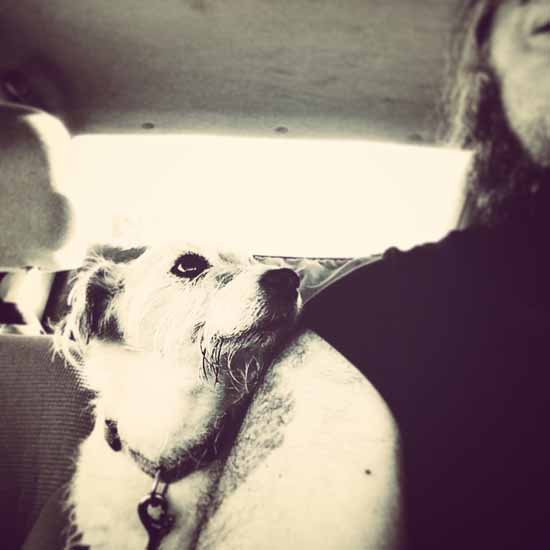
Getting all the dogs out became difficult in other ways as they aged. Orly, who was a selective listener during the best of times, grew completely deaf and couldn’t hear a call to come back even if he’d been willing to. Bernard got immobile to the point where he simply couldn’t undertake journeys beyond a trip to the mailbox. Velcro? Well, Velcro seemed to be nervous outside, like there were too many choices for her to entertain at one time so maybe it would be best to just stay indoors. So our pack was home more than it should have been, and Darla’s waistline, like mine, was proof.
Darla loved to get out, though, once we got going. We visited pretty much the same place every day — a primitive river access state park near home where she could go off-leash and not be bothered — but it was never boring. When I traveled I missed our outings. I’m sure she did too. She got in shape, fast. She sprinted and gamboled like she hadn’t for years. Hell, I did too. Okay, maybe I didn’t get to where I “gambol” so much, but I can hike a mountain and lean over and touch the fucking ground in front of my toes. It ain’t much, but I’ll take it.
That little dog and I were out in all weather. Rain. Snow. Heat. Mud. The sketchier the weather the better, because no one else would be out. Darla loved wading into the river at various access spots, regardless of season, and, being low to the ground, that meant she was pretty much horribly filthy all the time. She would interact with other people only enough so that they were aware of how cute she was, then she’d be on about her business. She rarely engaged with other dogs at all, and then only small ones. If she was uncertain, she made a point to hide herself behind me, which made me feel big and tough and protective, which was great for my ego. The only time she got riled up is if large puppies tried to engage with her — usually labs or some other gangly, obnoxious breed — and they invaded her space. More than once I saw her snarl, ready to fight; thankfully she was easy to scoop up and carry away before anyone got hurt. Plus, by that point, she didn’t have enough teeth left to savage anyone with anyway.
In her company I re-discovered my love for being outdoors in ways I think maybe I’d forgotten. So often trips outside had been for fitness, not awakening. Any spiritual exercise was secondary. With Darla I slowed down. I began paying close attention to birds. It was about what I could see, and experience, rather than how far I could go and how fast. I can remember specific moments, often when I’d gone straight from a yoga class to pick Darla up and take her out, when I would stand on the bank of the river in the breeze and a physical sensation of connectedness and joy would overtake me. The sight of Darla and her scruffy face grinning ear to ear would make me feel like a tub of benevolence had just been poured over my head. I was the fat, laughing Buddha. With a beard. Watching her run sometimes I think Darla felt the same way.
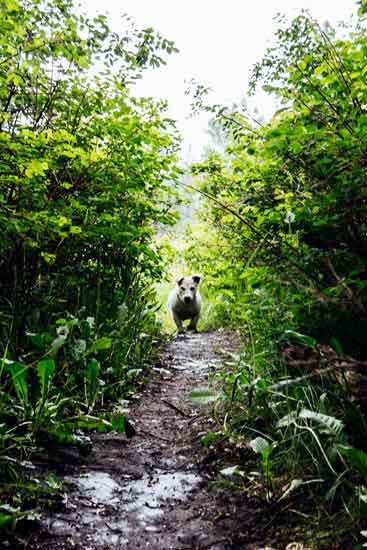
When Bernard died, Julia and I hoped we would have Darla at least five more years. We got two-and-a-half. Last spring she started having a little difficulty breathing, but nothing terrifying. After a short trip to Washington we came home and it was clear she’d taken a turn for the worse. A trip to the vet and an x-ray revealed a heart swollen well beyond anything she could recover from, to the point it was shifting all of her other organs out of place, essentially strangling her. We made a horribly difficult decision, and just like that she was gone. The silence in the house in the aftermath was overwhelming.
Sometimes we don’t know how empty we are until something comes along and fills us. I have dear relationships with people too, people I live for and would die for, but Darla gave me something I needed and didn’t know it. She was a guide, of sorts, who led me back to a key part of what makes me someone anyone would want to share time and space with. It’s like she recognized my grief — for my father, and the loss of the other animals, not to mention the gigantic and terrifying changes in my life that I had initiated — and somehow hoisted me up on her shaggy little back and carried me out of it. I like to think that in some way I was the same for her, but that could be the ego talking again. I bow to her a thousand times, ten thousand times, regardless.
Unlike Harrison and his log sitting, I don’t have a list of any simple rules for dog walking. I would just recommend that if you have a dog, get out with them whenever you can. Receive the gifts they live to give to you with gratitude. And if you bag up their shit, don’t leave it trailside. I don’t know that I’ve made it all the way back out of my own deep hole or not. I just know that the journey must continue without Darla. Some days it seems bearable, others not so much. I might not have gotten started when I did, if at all, without her and her relentless enthusiasm for life no matter how she must have felt, physically, in the final weeks of her life. The gift of life she returned to me fills me with immeasurable gratitude.
The Danish philosopher Soren Kierkegaard wrote, “Above all do not lose your desire to walk. Everyday I walk myself into a state of well being and walk away from every illness. I have walked myself into my best thoughts and I know of no thought so burdensome that one cannot walk away from it.”
I would amend that to add, “Just remember to be curious. To be kind to those you encounter. And whenever possible, be sure your walking is in the wake of a joyful, boundless, and furry little butt.”


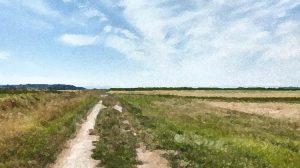
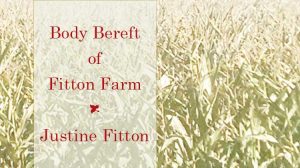

Stephanie Brown says
Lovely!
Chris says
Sam and Katie, thank you.
Katie says
Chris,
I finally found time to read this lovely little gem. What a well-wrought portrait of the very dog, and such lovely photos. Thank you for this, and for sharing some of your adventures with us.
Sam Silva says
nice piece
Chris La Tray says
Thank you, Emily. And thanks for taking the time to read it.
Emily Sinclair says
Chris,
This is just beautiful–thank you. I have my own aging Darla, but have not put words to the experience of being with her in this way, and am grateful to you for this.